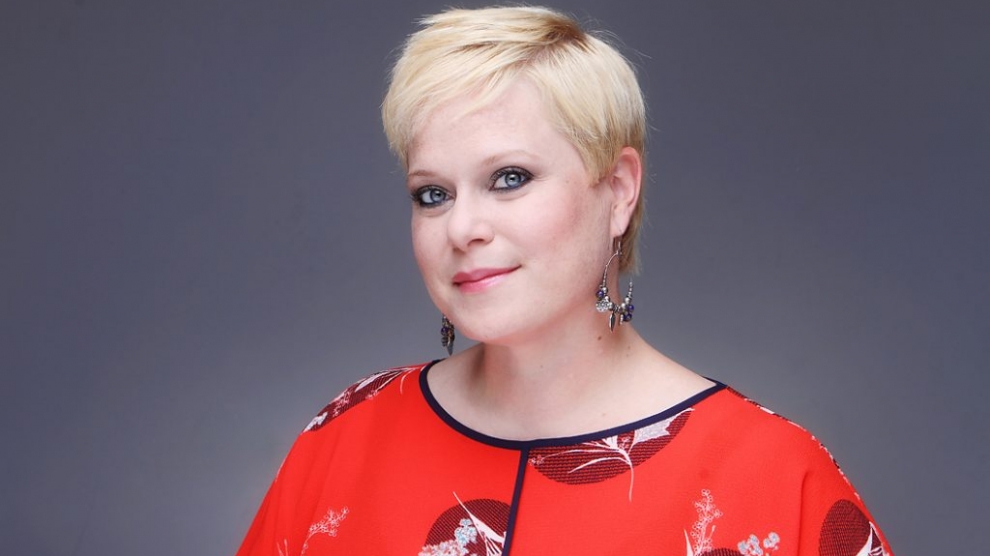In 2016, Veronika Pistyur became the first Hungarian woman to be named Female Role Model of the Year by the Central European Startup Awards. Now the CEO of Bridge Budapest, supporting Hungarian entrepreneurs, she speaks to Emerging Europe about her current projects and the status of young female entrepreneurs in Central Europe.
Veronika Pistyur has been a well-known figure in Hungary since 2005 when she started co-hosting a TV show called Két TestŐr, a programme themed about life, family and health that quickly became popular with Hungarian viewers.
After spending five years on the screen, in 2012 she became the CEO of Bridge Budapest, a not-for-profit initiative of the most successful Hungarian start-ups founded by Prezi, a software presentation company and LogMeIn, a Hungarian-founded IT start-up based in the US. The organisation was founded to widen and improve the entrepreneurial climate in Hungary with a special focus on mentoring young people and aspiring start-uppers.
Pistyur describes the role of Bridge Budapest as “building long-term thinking and a value-driven business community in Hungary.”
She has since emerged as one of the most influential women in the Central European start-up world and is part of several other business projects. She joined Gyula Fehér, the co-founder of Ustream, a Hungarian start-up since sold to IBM, as a general partner of a regional venture capital firm, Oktogon Ventures.
“We invest in high growth technology start-ups related to Central and Eastern Europe. This challenge strengthened my mission to support as many entrepreneurs as possible to become role models, the real heroes of our age in contributing to building a meaningful work environment, and building a globally competitive and lovable country,” she tells Emerging Europe.
According to her, the Central and Eastern European region is lucky enough to have more and more great success stories, with local entrepreneurs able to conquer the global market.
“After their exit, they are among the most useful and most inspiring models of the business sector. They can share how to build a global company in our region from scratch, and they are still motivated enough to give something back through their knowledge and internationally integrated networks. These people can rewrite the business mentality and perspective of the society,” she says, pointing to Skype, whose original software was created by Estonian entrepreneurs in 2003.
Discussing the start-up scene in Central and Eastern Europe, she explains that over the past five years, she has been seen more and more female-founded start-ups.
“Still not enough, but more,” she says, noting that “the sad situation is that we lose most of them in the scale-up phase, where the foolish and extremely time-heavy part of building a business comes out.”
“We see more zebras among women than unicorns. I don’t say that this must change, but having great female role models is essential if we want to strengthen young female entrepreneurs to take risks and start doing great businesses,” she adds.
Ms Pistyur shares the same opinion when it comes to business leaders in general across the region. She believes that the situation in this regard is getting better and better, but too slowly.
“While more leaders stand up and speak out on equality issues, showing inspiring examples on how to build a balanced life – not just women but progressive men – we still need business and policy incentives as well and more awareness in every angle of our lives,” she says, stressing the attention of every small step that could lead to meaningful change.
“We need to see not just artists but business role models on covers and billboards,” she says.
Addressing young people and women who aspire to become entrepreneurs, she has three key pieces of advice.
“If something is right for you, that could also benefit your business. It means you might be hard on yourself. Put a lot of extra effort into understanding your limits,” she says, highlighting that building a company does not fit everyone’s personality.
Secondly, she tells young people to use “Google and spreadsheet” when starting out. “We have to to explore what can be done, what a real solution and a real problem is and what is not, while the spreadsheet part is about counting and planing a bit, so that we are not surprised if the sums do not add up. ‘If I have these costs, can I earn enough income?’”.
“Finally, after being hard on yourself and understanding your market and the real needs of the people you would like to create your product/service for, you should aspire to create win-win situations. Business is mostly about competition, but winning the battle can be done through cooperation too,” she concludes.
—
Photo courtesy Veronika Pistyur

